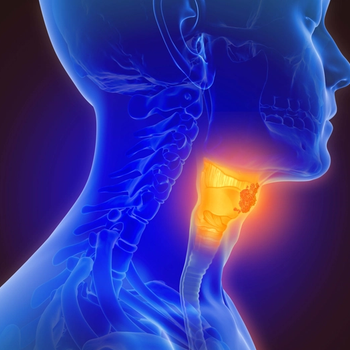
Durvalumab Yields Clinically Meaningful OS Benefit but Misses the Mark in PD-L1–High Metastatic NSCLC
Data from the phase 3 PEARL trial indicated that durvalumab yielded a clinically significant improvement in overall survival but did not meet statistical significance among patients with stage IV non–small cell lung cancer with high PD-L1 expression.
Durvalumab (Imfinzi) monotherapy demonstrated an improvement in overall survival (OS) that was deemed clinically meaningful but not statistically significant vs chemotherapy in a subgroup of patients with stage IV or metastatic non–small cell lung cancer (NSCLC) with a PD-L1 expression of more than 50%, according to a press release from AstraZeneca on findings from the phase 3 PEARL trial (NCT03003962).
In addition to the efficacy findings, investigators reported that the safety and tolerability of durvalumab in the PEARL trial was consistent with previously reported findings from other studies. Additionally, the agent did not produce any new safety signals.
“With PEARL, we set out to answer important scientific questions in the treatment of metastatic [NSCLC] at a time when patient selection for immune checkpoint inhibitors was still evolving,” Susan Galbraith, executive vice president of Oncology R&D of AstraZeneca, said in the press release. “We are encouraged to see patients in the metastatic setting at a higher level of PD-L1 tumor expression demonstrate the most benefit with [durvalumab] monotherapy treatment, as is commonly seen in this class.”
Investigators of the randomized, open-label, multicenter phase 3 PEARL trial assessed first-line, single-agent durvalumab vs platinum-based chemotherapy among patients with metastatic NSCLC. Patients were enrolled in treatment centers across Asia, Europe, and Australia, although the study was primarily conducted in Asia.
The primary end points of the trial were OS among patients whose PD-L1 tumor expression was 25% or more and in those identified as being at low risk for early mortality. Secondary end points included objective response rate, duration of response, progression-free survival following subsequent anticancer therapy, and disease-related symptoms and health-related quality of life based on the European Organization for Research and Treatment of Cancer Quality of Life Questionnaire.
Patients 18 years and older with documented evidence of stage IV NSCLC were eligible to enroll on the study. Additional inclusion criteria included having an ECOG performance status of 0 or 1. Patients were also eligible to enroll on the trial regardless of whether they smoked or if they had squamous or non-squamous histology.
Patients who harbored EGFR mutations or ALK rearrangements were not able to enroll on the trial. Patients were also unsuitable for enrollment if they had received prior chemotherapy or any other systemic therapy for metastatic NSCLC; received prior immune-mediated therapies including anti–CTLA-4, anti–PD-1, anti–PD-L1, or anti–PD-L2 antibodies; had brain metastases or spinal cord compression; mixed small cell lung cancer and NSCLC histology; or active or previous autoimmune or inflammatory disorders such as colitis or Crohn’s disease.
Reference
Update on PEARL phase III trial of Imfinzi monotherapy in stage IV non-small cell lung cancer. News release. AstraZeneca. December 19, 2022. Accessed December 19, 2022. bit.ly/3WtBBn3
Newsletter
Stay up to date on recent advances in the multidisciplinary approach to cancer.










































